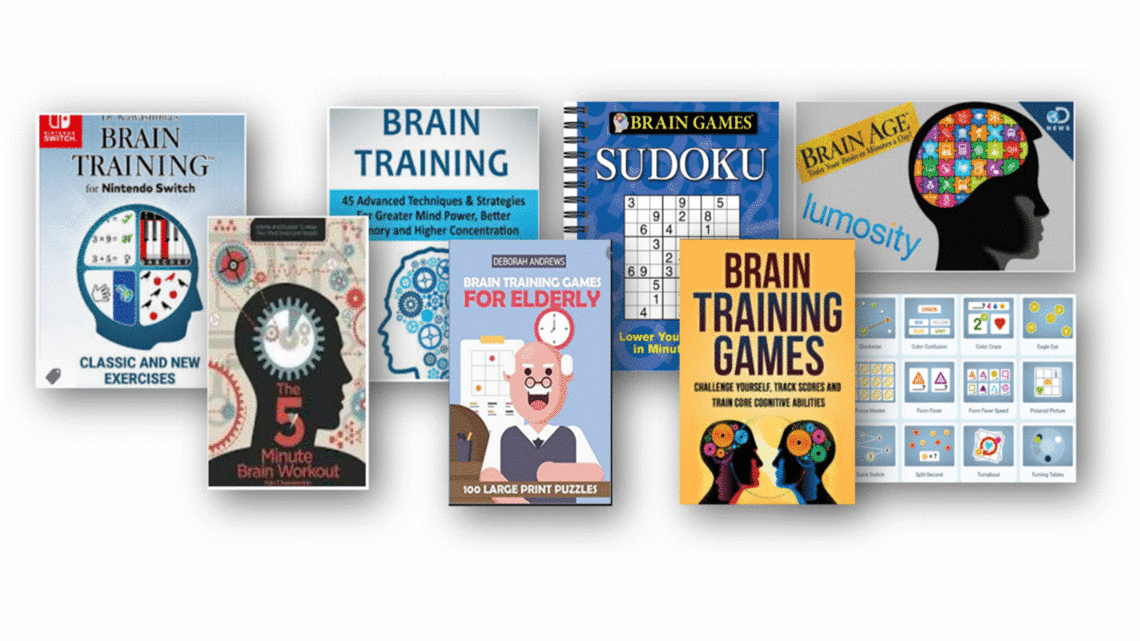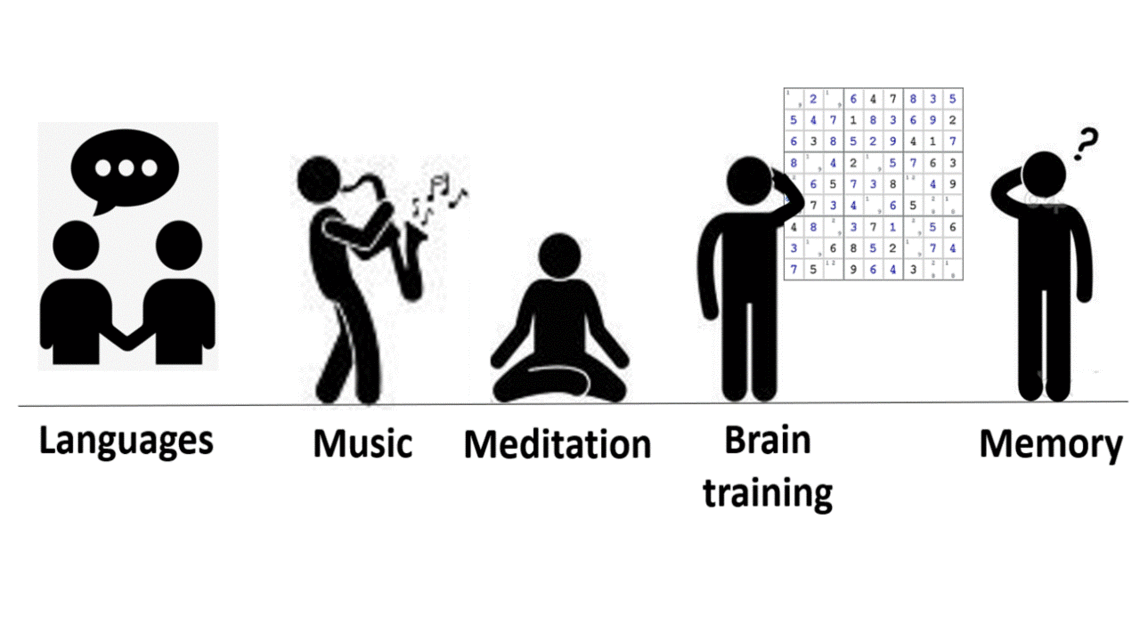What can I do to keep my brain healthy? How can I improve my memory? Is Sudoku good for my brain?
- Can learning a new language protect our brains?
- Could being a musician also help?
- What about meditation?
- Can ‘brain training’ help?
- Conclusions
Can learning a new language protect our brains?
Studies over the last 10 years suggest that being bilingual (i.e. being able to speak two different languages fluently) helps protect our mental ability. For example, a study published in 2011 analysed CT scans of patients who had been diagnosed with probable Alzheimer's disease. The study found that people who speak more than one language were able to tolerate twice as much brain damage as people who spoke only one language before they exhibited symptoms of Alzheimer's disease.
|
Studies have found that bilingualism delays the onset of Alzheimer's symptoms by up to five years. |
In the following year, Dr. Ellen Bialystok, a psychologist and professor at York University, Toronto, Canada published a review of studies which used both behavioural and neuroimaging (brain scanning) methods to examine the effects of bilingualism on cognition in adults. She concluded that the brain’s need to manage two languages over a long period of time gives the bilingual person greater cognitive control over the way in which their brains process language, perhaps even enhancing their mental flexibility.
|
Mental flexibility is the ability to move between different mental tasks simultaneously, and to apply concepts from one context towards solving a problem in another, unrelated or new situation. Psychology Today |
A 2017 study of patients with Alzheimer’s disease found increased connectivity in the brains of bilingual patients compared with the brains of monolingual Alzheimer patients. Also, the degree of lifelong bilingualism was strongly associated with higher levels of cognitive reserve in dementia and with protection against the progressive loss of function of the brain’s neurons.
While a 2019 study of 253 patients with probable Alzheimer’s found that the onset of the disease for those who were bilingual was, on average, four years later than for those who spoke only one language.
Could being a musician also help?
A small-scale study published in 2011 researched 70 healthy, older adults, comparing non-musicians with low- and high-activity musicians. This preliminary study found that participants with at least 10 years of musical experience had better performance in non-verbal memory and executive processes in advanced age compared with non-musicians. It concluded that high musical activity throughout life helps preserve cognitive functioning in old age.
And a study published in 2018 concluded that ‘life-long music training may be associated with enhanced auditory and cognitive performance, including complex cognitive skills, in advanced age’.
Another small study, published in 2016, reported that life-long music practice may increase resistance to cognitive ageing and reduce the effect of cognitive decline in older musicians.
More research is clearly needed, but the fact that many professional musicians continue to play, conduct and perform well beyond conventional retirement age suggests that this may be a fruitful area for future research.
What about meditation?
Mindfulness meditation practice (MMP) is a type of meditation practicethat teaches you to slow down racing thoughts, let go of negativity, and calm both mind and body. A 2011 systematic review analysed 23 studies and concluded that mindfulness meditation training could be associated with a number of improvements in the way the brain works, including working memory and some executive functions which are needed to control our behaviour. However, the review also noted some limitations in the research as well as some negative results, suggesting that further high-quality studies are still needed.
Another review of published studies in 2016 reported that brain-imaging studies (where the brain is scanned) suggests that meditation may protect the brain, possibly by reducing age-related degeneration of brain tissue. However, the review cautions that a cause-and-effect relationship has yet to be established.
Similarly, a 2018 review on the ageing brain and mental training through meditation, found that psycho-affective factors, cognition, and brain structure and function improved, with a reduction of depressive symptoms, stress, anxiety and sleep disorders. The review concludes that meditation practice could be particularly beneficial, especially as it targets the emotional dimension of ageiing.
Can ‘brain training’ help?
There are many brain-training books, games and videos on the market, with a worldwide value of USD 8.06 Billion forecast for 2021. However, few of these products have been rigorously tested on older adults in empirical scientific studies.

Video- and computer-based brain training has been available for some years now. A 2012 systematic review looked at 38 different studies published between 1984 and 2011. These studies suggest that brain training (whether on paper or computer-based) is probably not harmful but is likely to have only modestly positive effects. Such training also needs to include different skills, because focusing on one specific skill may not have the broader cognitive effects being aimed for.
However, a 2015 study, with 7,000 participants, reported more positive results. The Alzheimer's Society, which funded the research, reports that crosswords, Sudoku puzzles and computer games can improve both reasoning skills and memory, and may even help older people with everyday tasks such as cooking, shopping and managing personal finances.
In addition a small study of 20 patients reported in 2011, found that Sudoku-based brain training appeared to improve the cognitive performance of patients suffering from Parkinson's disease.
A large-scale, cross-sectional study in 2019 (with participants who used different brain-training devices), found that there were cognitive advantages for those who played computer and board games continuously. Those who had undertaken brain training for a year improved both their working memory scores and their verbal scores compared with their scores at the start of the brain training.
Make sure that brain training is meaningful and enjoyable
A review of 36 studies, with 10,000 participants, found that many participants said that thinking did not come easily to them, but that they enjoyed thinking more when they used ‘thinking aids’, such as taking exercise and engaging in new activities, and when they felt that their thinking was meaningful to them. This review also found evidence for the benefits of ‘thinking for pleasure’, including an intervention study in which participants found thinking for pleasure enjoyable and meaningful in their everyday lives.
|
You can take pleasure from thinking when you deliberately focus only on your thoughts, with the goal of generating positive feelings. |
Conclusions
- Learning a new skill which requires our brain to work in a different way (like learning a new language or playing a musical instrument) seems likely to protect our brain and keep it functioning effectively for longer.
- Brain training (whether on paper or computer-based) is probably not harmful and may help improve your speed-of-processing and your reasoning skills, but it may not improve your memory.
- Brain training is likely to be more effective with ‘thinking aids’ and when it is enjoyable or personally meaningful.
Reviewed and updated by Norin Begum, November 2020. Next Review Date October 2024.
__________________________
Other relevant articles on the Age Watch website:

